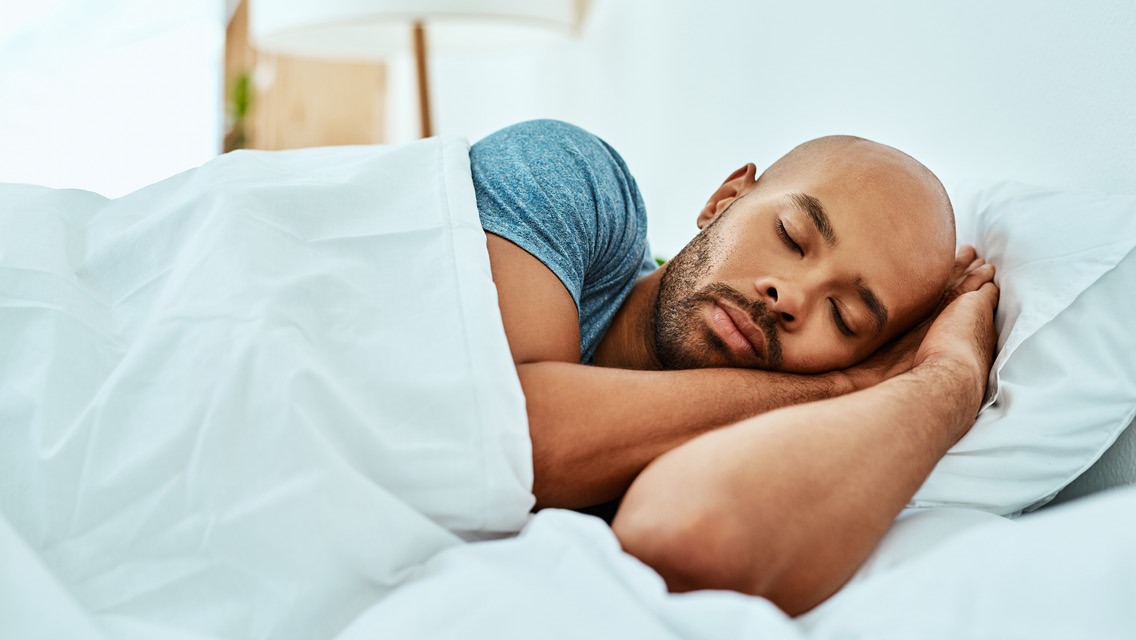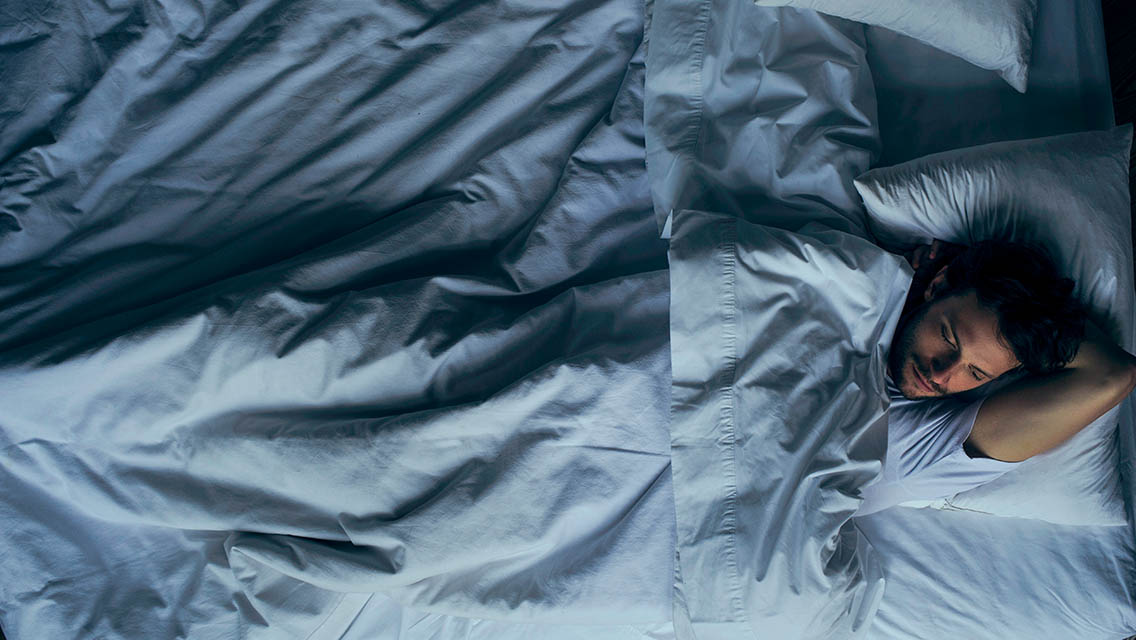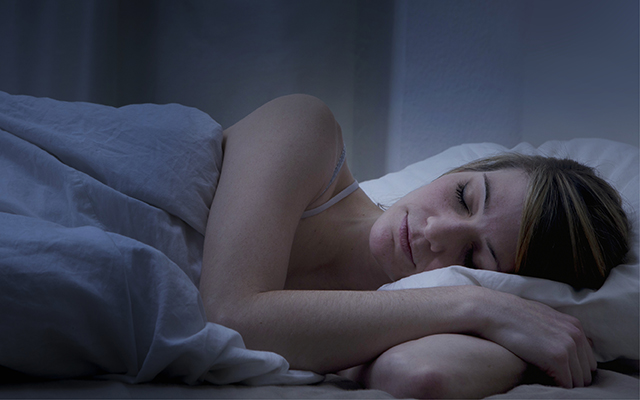How much sleep did you get last night? Odds are it wasn’t enough. “No problem,” you tell yourself. “I’ll make up for it tonight.” But will you? Not likely.
The average American gets seven and a half hours of sleep a night, a substantial drop from the nine hours of slumber our grandparents enjoyed, and a substantial skimp on the optimal eight to eight and a half hours that science says most adults require.
The culprits, according to sleep experts, are 21st-century distractions: longer work hours, the draw of the Internet and the pervasiveness of screens in bedrooms. Many Americans have grown accustomed to shaking off midday fatigue with jolts of cola or extra cups of coffee. But even if you manage to struggle through your days without chemical assistance, you should be aware that chronic sleep deprivation might be harming your body in unseen ways.
Inadequate sleep can lead to serious health risks. One of the most obvious dangers is falling asleep at the wheel. Drowsy drivers cause roughly 100,000 accidents a year, according to the National Sleep Foundation. Other harmful effects of sleep loss, however, are much more subtle.
“Chronic sleep deprivation is insidious,” says Sean P. A. Drummond, PhD, an associate professor of psychiatry at the University of California, San Diego, and the VA San Diego Healthcare System. “Most people don’t realize they are sleep deprived because their perception of what ‘normal’ feels like has shifted.” People have grown so accustomed to running on inadequate sleep, he says, that they take it in stride.
In his sleep laboratory, Drummond often sees people who snatch just six hours of sleep a night and convince themselves they are doing fine. “The body’s ability to function on less sleep lulls people into a false sense of security,” he says. “But normal isn’t the same as optimal. And the body functions much less efficiently when sleep deprived.”
A full night of restful sleep isn’t an indulgence, insist medical experts. It’s a necessity. New research is revealing just how inefficient the sleep-starved body can be. So before you decide to stay up late again tonight, or set your clock to go off in the wee hours of tomorrow morning, take a moment to learn how even subtle forms of sleep deprivation can sabotage your effectiveness, focus and vitality.
Why We Snooze
Even though everyone sleeps, no one knows exactly what purpose it serves. “Sleep is such a complex process, and it involves so many brain and body systems, it’s hard to weed out the fundamental function,” says Drummond.
Of course, that’s not to say there aren’t dozens of theories behind the sleep enigma. One popular perspective suggests that sleeping evolved as a survival tool. Mammals that move around too much at night are more likely to become other animals’ midnight snacks. Other theories focus more on the biological need for sleep. Many experts argue that while we sleep the body replenishes certain hormones and accomplishes important restorative and repair tasks. Still others believe sleeping allows the brain to rid itself of harmful free radicals.
Although experts are still unraveling the mystery of sleep, one thing is clear – the body suffers greatly without a good night’s rest, becoming more vulnerable, less resilient and less efficient as its sleep debts increase. And it’s not just chronic insomniacs who need to worry. According to the latest research, people who electively cheat on their sleep, even for just a week, increase their susceptibility to chronic illness.
Heart disease, in particular, is sensitive to lack of sleep. The most dramatic proof of this to date was published last year in the Archives of Internal Medicine (Jan. 27, 2003).
Researchers at Harvard School of Public Health and Brigham and Women’s Hospital in Boston examined data from the ongoing Nurses’ Health Study to find connections between sleep and heart health. The study looked back 10 years at the sleep habits of approximately 70,000 women. The investigators found that women who slept five or fewer hours were roughly 40 percent more likely to suffer from heart disease than those who received a full night’s rest.
Following that group were women who slept just six hours a night (the sleep allotment of one in three Americans). Their risk of heart disease increased 18 percent.
It appears that sleep deprivation puts the body at a severe disadvantage in fending off all kinds of maladies. People who don’t get enough sleep also tend to have higher blood pressure, poor blood-sugar regulation and increased inflammation, says Najib Ayas, MD, the study’s lead investigator and an assistant professor of medicine at Vancouver General Hospital in British Columbia. “All of these things are risk factors for heart disease.”
Although the study hasn’t been duplicated in men, Ayas speculates the findings would be similar. He says there’s a clear message that all people should take away from the study and put into practice in their own lives: “Adequate sleep should not be considered a luxury,” he says, “but rather one of the pillars of a healthy lifestyle.”
Can Lack of Sleep Increase Diabetes Risk?
A chronic lack of sleep may also pave the way for type 2 (adult-onset) diabetes. And the prevalence of diabetes is reaching epidemic proportions.
One in 10 Americans already suffer from the disease and the numbers are expected to climb dramatically in coming decades. Although most of the focus of diabetes prevention is on diet and exercise, chronic sleep loss may pose an additional threat because it undermines the body’s ability to regulate blood sugar.
The connection between risk factors for diabetes and sleep has been firmly established in the wake of a groundbreaking study published in the British medical journal The Lancet (Oct. 23, 1999).
To examine the effects of sleep loss on the endocrine system, researchers at the University of Chicago recruited 11 young, healthy men. For the first few nights they allowed the men to sleep a full eight hours. Then for six consecutive nights, researchers restricted their sleep to just four hours. At the study’s conclusion, the men were allowed to sleep 12 hours straight for seven consecutive nights.
The results showed that the subject’s glucose tolerance and stress hormones were in the normal range as long as they were getting plenty of sleep. But on days when they were sleep deprived, their bodies’ ability to regulate glucose plunged by 30 percent – nearly identical to what’s found in patients with type 2 diabetes. The researchers believe a lack of sleep threw off the brain’s ability to correctly regulate the function of the pancreas.
One of the researchers’ most interesting findings, says Drummond, was that the quality of the men’s diets (they were allowed to choose from a list of foods) steadily deteriorated as the experiment progressed. “As people developed insulin resistance, they started requesting more candy, cake and chips,” he says. “On a speculative basis, sleep loss might be said to contribute to obesity.”
Sleep Loss and Inflammation
Anywhere heart disease and diabetes lurk, chronic inflammation is sure to follow. A recent study published in the Journal of the American College of Cardiology (Vol. 43, No. 4, 2004) showed that sleep loss promotes low-level inflammation and therefore helps chronic disease gain a dangerous foothold.
Scientists enrolled 10 healthy volunteers with no signs of chronic inflammation. For 10 straight nights, the participants were allowed just a little more than four hours of sleep. Blood samples were taken on day one and day 10 of the study and tested for levels of C-reactive protein (CRP), a marker used to measure the level of inflammation present in the blood.
At the end of the study, those participants robbed of sleep had a fourfold increase in CRP levels. “Sleep deprivation induces stress and elevations in cortisol (the stress hormone), which increases CRP levels,” says Jack Challem, a medical researcher in Tucson, Ariz., and author of The Inflammation Syndrome (Wiley, 2003). “CRP sets off a cascade of problems.”
If this news makes you want to crawl into bed and never come out, don’t worry, there is an upside. Within a week or two of proper rest, the body reverses many of the ill effects of sleep loss. The body has an amazing ability to heal itself, says Drummond. “You can dramatically lower your risk factors for several diseases by just getting more sleep.”
How Many Hours of Sleep Do You Need?
Whether you’re getting enough sleep or not, chances are you already know exactly how much slumber your body requires. (If there is any doubt, just go to bed when you are feeling tired. Don’t set the alarm and sleep as long as possible. If you wake up feeling refreshed and you don’t feel sleepy during the day, you’ve found your magic number.)
For the majority of people, that ideal period is between eight and eight and a half hours. People who need less or more sleep are most definitely the exception and not the rule, says Maurice Ohayon, MD, PhD, director of the Sleep Epidemiology Research Center at Stanford University. According to Ohayon’s research, roughly 10 percent of people land on either end of the spectrum. On one end are people who need just six hours or less a night. Occupying the sleepier side are those whose bodies demand nine hours or more.
While the need or desire for sleep may temporarily fluctuate up or down in times of excitement, crisis, illness or injury, your preprogrammed need for sleep is unlikely to change much over the course of your adult lifetime. Thus you are unlikely to be successful in putting yourself on a “sleep diet” over the long term.
People also like to fool themselves into thinking they can deplete sleep reservoirs during the workweek and make it up on weekends.
The idea may sound tempting, especially if your boss brags about needing only four hours of sleep and wonders why you can’t do the same. Or if you just have so much to do that sleeping seems like a waste of time. “Sleeplessness is society-driven in many ways,” asserts Drummond. “Too often our worth is judged by how much we produce, so people push themselves beyond their limits.” No matter how much you try, though, if you’re an eight-hour sleeper, training your body to adapt to a six-hour schedule is impossible, he says. “Your personal sleep need is a physiologically driven phenomenon.”
People also like to fool themselves into thinking they can deplete sleep reservoirs during the workweek and make it up on weekends. Unfortunately, this system doesn’t work, says Ohayon. In fact, by changing your sleeping pattern on the weekends, you may end up making matters worse. “Sleeping late on weekends only compounds the problem,” he says. “You can’t reimburse your sleep debt in one or two nights. You must sleep well for several nights in a row.”
Americans may be getting the hint. Luxuriant master bedrooms are slowly replacing gourmet kitchens as the spaces where homeowners are willing to splurge, says Ohayon. He points to the growing awareness of good “sleep hygiene,” such as buying a quality mattress and creating a restful environment, as signs people are beginning to wake up to the importance of sleep. Even so, people have a long way to go before they are giving rest the respect it deserves. “Considering that we sleep one-third of our lives, we should really invest one-third of our attention to getting a good night’s sleep,” says Ohayon. “But we don’t.”
9 Sleep Tips
Eager to get more and better Zs? Begin with these strategies.
- No. 1: Prioritize. Set a strict bedtime and stick to it. Just like being perpetually late for work, you have no excuse for missing your bedtime five out of seven nights a week. If you need help putting yourself in sleep mode, set an alarm for 30 minutes before your scheduled departure to snoozeville. When it goes off, drop what you’re doing and begin to wind down. Take that extra half hour to walk the dog, brush your teeth, take a bath, do a little reading, etc.
- No. 2: Ritualize. Whatever your bedtime routine, the key is to be consistent. “Having a ritual – even if it’s just washing your face and brushing your teeth – helps condition your body to know it’s time to go to sleep,” says Nancy Blatt, executive director of the Better Sleep Council. Above all else, make a point of waking up at the same time each morning. Ideally, you’d wake up at the same time even on weekends and days off.
- No. 3: Climatize. You probably know your bedroom should be dark and quiet, but temperature is equally important. A comfortable room temperature is between 68 and 72 degrees Fahrenheit – but only when you’re awake. The ideal sleeping temperature is slightly cooler: between 60 and 65 degrees. The reason is that a sharp drop in body temperature often induces sleep, which is why lying in a cool bed after a hot bath is so relaxing. Lower the thermostat before bedtime. If you’re forgetful, install an automatic thermostat and program it to drop 30 minutes before bedtime and rise again in the morning.
- No. 4: Choose good bedding. Think of it this way: You spend way more time in bed than in your car, but which gets a higher priority? Invest in a good mattress and comfortable bedding. Cotton, down, silk, wool and other natural fibers breathe best and often wear better over time. But be certain you aren’t allergic to any materials on or near your bed. Keep bedding clean and inviting. Consider an air purifier (and possibly a humidifier) if you have problems breathing well at night.
- No. 5: Don’t blur bedroom boundaries. “More and more people are heading into the bedroom at 6 p.m. to eat dinner and watch television,” says Ohayon. “The bedroom shouldn’t become a dining room or a living room. It’s just not conducive to a good night’s sleep.” Banish televisions, computers, phones and other distractions. Reserve the bedroom for sleeping and intimacy only.
- No. 6: Feng Shui your space. Experts in feng shui, the ancient Chinese art of placement and design, assert that clutter blocks your flow of energy (chi), disrupting your sleep. Declare your bedroom a clutter-free zone. Create a smooth flow of energy by removing piles of clothes from your sight, tossing junk mail and papers and culling last month’s magazines from your bedside table. Close drawers and closet doors before getting into bed. Finally, feng shui advises against placing your bed directly under a large window and also suggests avoiding having the head of your bed too near the room’s entrance door. (For more tips on how to make your bedroom more of a sanctuary, see “3 Spaces to De-Clutter Now”.)
- No. 7: Watch what you eat. Ideally, to give your body enough time to fully digest, you shouldn’t eat a regular meal within two hours of bedtime. If you must eat near bedtime, eat lightly, and when possible, reach for foods that trigger the release of serotonin, the body’s natural sleep inducer. (See “The Food-Sleep Connection“.) For several hours before bedtime (some experts suggest up to eight hours), you should limit or eliminate your intake of alcohol and caffeine, as well as foods high in sugar or salt, all of which can have sleep-disrupting effects.
- No. 8: See the light. Exposing yourself to bright light during the day can encourage better sleep at night. Sunlight suppresses melatonin levels, which increase when the sun sets and helps you sleep. (Think of it as conserving gas for a long car trip.) Experts still aren’t sure how much light is needed to transport you to dreamland, but most point toward 20 minutes each day for adults. A good way to see the light is to exercise outdoors. People who take their workouts outside get roughly three times the average amount of light.
- No. 9: Sleep less. This advice may seem counterintuitive, but experts say it’s one of the best ways to tame insomnia. People with insomnia often try to compensate by spending more time in bed, says Shawn Youngstedt, PhD, a sleep researcher at the University of South Carolina. The result, he says, is fragmented sleep. The solution? “Spending less time in bed consolidates sleep time,” he says. Begin with the goal of sleeping five or six hours a night – say from midnight to 6 a.m. Go to bed and get up at the same time every day until you can sleep through the night. Then gradually begin to lengthen the time you spend in bed until you find a routine that works well. In 2001, Duke University researchers used this method to treat 25 people with insomnia. In the end, they reduced their nighttime wakefulness by more than one-half.
Perhaps the most important thing to remember is that, right up there with choosing healthy foods and getting enough exercise, making adequate sleep a priority is one of the highest-impact things you can do to maintain and improve your health.
Keep in mind, too, that many of the other positive efforts you are making (like completing tough workouts and taking in lots of good nutrition) can easily be undermined and blunted in their effects if you are depriving your body of its prime recovery and regeneration cycle.
So if you’ve been taking sleep for granted, making it an afterthought, relegating it to the bottom of your to-do list, or – heaven forbid – dismissing it as a necessary evil, you might want to rethink that point of view. At the very least, it’s a decision you should sleep on.
Sleep Disorder Glossary
Sleep disorders are surprisingly common (more than 70 million Americans suffer from a sleep problem, according to the National Center on Sleep Disorders Research). You should consult your doctor or a sleep expert if you suspect you might have any of the following:
Snoring: Snoring affects roughly 50 percent of men and 25 percent of women. The harsh, guttural sound is created when relaxed tissues in the back of the throat vibrate in response to passing airflow. Snoring treatments are plentiful and vary in simplicity and effectiveness. For example, losing excess weight or changing sleep position often solves the problem. Other times, laser surgery is required to eliminate extra tissue at the back of the throat.
Bruxism: This occurs when you wake up with tension headaches or a sore jaw from grinding or clenching your teeth while you sleep. It’s the third most common sleep disorder, after talking and snoring, and plagues up to 20 percent of sleepers. Treatments range from mouth guards to meditation. Ask your dentist to monitor your teeth for damage and for suggestions on how to quit.
Restless Legs Syndrome: People with restless legs syndrome (RLS) often experience uncomfortable aches and pains in their legs while sitting, lying down or sleeping. Moving the legs can relieve the discomfort, but in turn it often disrupts one’s sleep. Up to 12 million Americans suffer from RLS. For more information, contact the Restless Legs Syndrome Foundation at www.rls.org.
Sleep Apnea: Sleep apnea is a disorder during which breathing is repeatedly cut off during sleep. The walls of the throat collapse on themselves, stopping airflow. After 10 to 30 seconds, the brain rouses the body enough to open the throat and take another breath. Many people with sleep apnea don’t realize they aren’t sleeping soundly at night but still suffer from severe daytime drowsiness. Like snorers and restless legs sufferers, they may negatively affect their partner’s sleep. Sleep apnea has also been linked to hypertension and heart disease. For more information, visit the American Sleep Apnea Association at www.sleepapnea.org.
Narcolepsy: People who find themselves overwhelmed by the desire to sleep at inappropriate times may be narcoleptic. Narcolepsy is when the wakeful brain slips into REM sleep; the primary symptom is excessive sleepiness. Although up to 200,000 Americans suffer from narcolepsy, experts believe fewer than 50,000 have received an accurate diagnosis. As yet, there is no cure, but the condition can be treated with lifestyle changes and medication. For more information, contact the Narcolepsy Network by visiting www.narcolepsynetwork.org.
How Does Exercise Affect Your Sleep?
The notion that regular exercise promotes a restful night’s sleep seems like a no-brainer. A tired body is a sleepy body, right? Yes and no.
First, consider insomniacs, who have the most to gain from a steady dose of exercise. Randomized, controlled studies of insomniacs show that those who get between 30 and 45 minutes of moderate aerobic exercise in the late afternoon or early evening on four or more days a week sleep better than their sleep-challenged counterparts who eschew routine exercise.
But the effects of exercise on otherwise average sleepers aren’t so black and white. The perception that exercise brings on sleep is generally based on the untrue assumption that physical fatigue is synonymous with sleepiness, says sleep researcher Shawn Youngstedt, PhD. “The two are very different things,” he says.
The relationship between good sleep and exercise is more complicated than it appears. People tend to exercise on days they have more free time and, therefore, are less stressed, says Youngstedt. And, of course, people sleep better when they are stress-free, and exercise helps many people blow off stress. Also, exercisers tend to be healthier than people who are inactive, and healthy people tend to sleep more soundly than those who are ill or in pain, according to Youngstedt.
Regardless of where exercise fits into the sleep equation, Youngstedt debunks the myth that working out late in the day interferes with a restful sleep. He points to several recent studies showing that vigorous exercise late in the day doesn’t hijack a person’s ability to snooze soundly, especially if you are fit. In one of his own clinical trials, he found that aerobically fit people could exercise up to 30 minutes before bedtime without compromising their ability to drift off to sleep (Journal of Sleep Research, 1997; 26:222).
You haven’t been aerobically fit since mandatory PE classes? In an earlier study on how exercise affects people at a range of fitness levels, researchers found that those who wrapped up their workout within two hours of bedtime still slept soundly. “If people get the false message that it’s bad to work out at night, it might keep them from exercising altogether,” Youngstedt says. “Better to exercise late at night than not at all.”
This article originally appeared as “Getting to Sleep”.





This Post Has 0 Comments